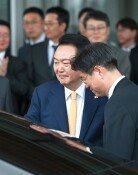Restructuring free welfare policy should be talked first before tax hike
Restructuring free welfare policy should be talked first before tax hike
Posted November. 11, 2014 06:34,
Moon Hee-sang, emergency committee chairman of the main opposition New Politics Alliance for Democracy, said Monday, Our problem is not excess of welfare but lack of it, adding, For our country not to give up both free childrearing and free school lunch, we have no choice but to raise taxes. He officially proposed the ruling Saenuri Party to form a body for grand social compromise to raise taxes, if the political circle cannot afford to reach an agreement. However, Kim Jae-won, vice floor leader of the Saenuri Party, expressed objection, saying, Now when the national economy is in a bad shape, we are in no position to discuss tax hike, adding, What we can do is to manage state finances in the most efficient way. A tax hike demanded by an opposition leader is inappropriate and irresponsible at best.
In the 2012 presidential election, the Saenuri Party pledged it would raise funds needed for welfare programs through restructuring of fiscal expenditures and legalizing of the underground economy, even without raising taxes. The party effectively promised welfare without a tax hike. Then presidential candidate Park Geun-hye garnered votes by making such election pledges and won the election. It is common sense that welfare expenses come from taxpayers money. Both the ruling and opposition parties raced to announce lavish welfare policies to secure votes in the election, but lawmakers are now devising measures to collect more taxes from the people after realizing they cannot afford to cope with shortages of funds.
A tax hike as envisaged by the NPAD entails collection of more taxes from the rich and a hike of corporate tax, which is populist policy. However, in practice it is not easy to raise taxes. Under the current tax law, individuals whose annual income of 20 million won (18,400 U.S. dollars) or less are not required to pay even a single penny. Some 53 percent of all salaried workers earn this amount or less. Under the income tax act that was revised in 2012, people whose taxable annual income is between 88 million won (81,000 dollars) and 300 million won (276,000 dollars) pay 35 percent (personal income tax deductibles) of the income, and people whose taxable annual income is 300 million won (276,000 dollars) or more pay 38 percent. High-income earners in the latter income bracket see their income tax rate increase by 3 percentage points from before, and are facing a higher tax rate. Unless the opposition party seeks to use tax hike as an excuse for political strife, its slogan revoke tax reduction for the rich is an argument hat is incompatible with the actual situation.
Raising the corporate tax is also far from being easy. Countries around the world are engaged in a borderless war to attract companies. If only Korea raises corporate tax rate, manufacturing plants are poised to move to overseas. Even economics textbooks suggest that a hike in corporate tax eventually passes on to workers and consumers and causes regressive income redistribution.
Before a reckless debate over a tax hike, the political sector should first restructure the country`s welfare policies. Even the U.S., whose per-capita income is three times that of Korea, is not providing free school meals and free childrearing. The U.S. is only providing welfare benefits selectively to those in extreme poverty. If state finance is not sound enough to keep all election pledges, the political leadership should frankly confess the reality to the public, and reduce unnecessary welfare benefits provided to better-off people. Only when selective welfare programs are implemented within the fiscal scope, then can the country achieve welfare without a tax hike.







